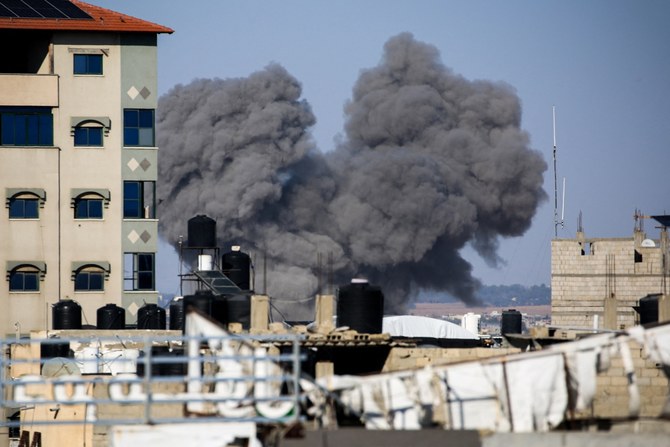
Not long ago a picture circulated from inside Gaza showing smoke billowing from the explosion of a US-supplied bomb, and discernible in the background was the outline of eight black parachutes dropping US aid in precisely the same neighbourhood. It was suggested that the picture would make an ideal cover for any book about the confused world disorder that the six-month war in Gaza have spawned – a disorder that as yet has no dominant player, value system or functioning institutions.
The great powers compete, coexist or confront one another across the region but none, least of all at the UN, is able to impose its version of order any longer. “Forget talk of unipolarity or multipolarity,” the journalist Gregg Carlstrom recently wrote in Foreign Affairs. “The Middle East is nonpolar. No one is in charge.”
Wars are supposed to be the father of all things, according to Heraclitus, and many still predict that this war will define everything in the future and prove a turning point to their advantage. Iran believes the US is closer to being forced out of Iraq than at any point in the last two decades and its president, Ebrahim Raisi, has said the war in Gaza will lead to a “transformation in the unjust order that rules the world”. Iran’s ally, the Hezbollah leader Hassan Nasrallah, whose group has traded fire with Israel across the Lebanese border, has claimed “the onset of a new historical phase” for the entire Middle East and that Israel will be unable to withstand the “al-Aqsa flood”.
By contrast, Benjamin Netanyahu, the Israeli prime minister, vowed on 9 October, two days after the Hamas massacre in Israel that triggered the war, that the region would be changed to Israel’s benefit. “What we will do to our enemies in the coming days will reverberate with them for generations,” he said.
Six months on, no one believes they have yet lost. And amid these conflicting assessments, China and Russia are not quite bystanders but do not lift a finger to ease US discomfort. Ever an opportunist, the Russian foreign minister, Sergei Lavrov, blamed American handling of relations between Israel and the Palestinians for the mess. “It was Washington’s policy of monopolising mediation and undermining the international legal framework for a settlement that resulted in the current escalation,” he said.
US support for Israel in the Gaza war was also seized upon as a golden chance for Russia’s rehabilitation after Ukraine. In language designed to appeal to the global south, Lavrov denounced America’s “incredible duplicity and double standards”.
Among emerging powers, the lesson of Gaza has been that it is time for new voices to join the top table. “This war is hideous but speaks to a bigger problem: the lack of reform of global governance institutions, including and primarily the UN security council,” said Filipe Nasser, a senior adviser at the Brazilian foreign ministry. “This is the point of convergence across the global south. They feel the international order is profoundly asymmetric and detrimental to their interests. The three US vetoes show how the rules are bent.”
The Turkish president, Recep Tayyip Erdoğan, has spoken of a similar crisis. “The current international system, devoid of fundamental concepts such as solidarity, justice and trust, cannot fulfil even its minimum responsibilities,” he said. South Africa’s foreign minister, Naledi Pandor, has described Gaza as the last manifestation of the conflict against colonialism and imperialism, and went to the international court of justice to prove her point.
Among western-based intellectuals, there is a sense that something deep is afoot. “The disaster in Gaza has completely disabused a large segment of liberals and professionals in the Arab world about western claims of upholding and caring about values in the conduct of foreign policy,” said Emile Hokayem, of the International Institute for Strategic Studies. “They look at the western debacle over Gaza and feel betrayed – or, for those who were always cynical about the west, vindicated. For example, some who sympathised with Ukraine have now switched their position. Senior western officials and diplomats are mostly clueless about this dynamic.”
Bronwen Maddox, the director of the UK-based thinktank Chatham House, has warned of wide repercussions. “The charge is the west writes the rules to suit itself. If countries which support Ukraine and are working for peace in the Middle East do not realise how powerful this charge has become, they will fail to help solve either conflict.”
Faced by this barrage, US diplomacy has not enjoyed its finest hour, as every day it seems its inability to control events becomes more apparent. It is locked in a war it had not foreseen, in a region it was seeking to leave behind, in defence of an ally that refuses to do as it asks.
The longer the conflict has continued – and few foresaw six months of it – the more US diplomacy has struggled to withstand the conflicting pressures. Netanyahu, wanting to win more time to “finish the job”, has shown himself unwilling to listen to Joe Biden, while the Gulf Cooperation Council, regardless of its private views of Hamas, has demanded that the US makes a decisive break with Israel and recognises Palestine as a state. The foreign affairs chief of the EU, where the US has many allies, has meanwhile claimed Israel has weaponised hunger, and even the UK has been moved to show some independence from Washington.
Through its Houthi allies attacking shipping in the Red Sea, Iran has revealed itself as a supple player and claimed strategic influence over three major economic choke points: the Suez canal at the north of the Red Sea, the Bab el-Mandeb strait at its south and the strait of Hormuz at the entrance to the Gulf.
US diplomacy has suffered defeat after defeat. On 27 October, 121 states at the general assembly backed an immediate humanitarian ceasefire, with 14 voting against and 44 abstaining. By 12 December, support for an unconditional ceasefire had hardened, with 153 in favour, only 10 against and 23 abstentions. Apart from the US, the total population of the countries in the US column was a paltry 68 million – hardly the kind of support the “indispensable power” should have at its disposal.
On 18 December the US was able to announce the names of only 10 countries willing to join Operation Prosperity Guardian, the naval alliance to protect freedom of navigation in the Red Sea. Apart from Bahrain, the home of the US fifth fleet, not a single Arab state joined the US alliance.
When Biden assumed the US presidency he recruited a team of prodigious foreign policy talent, perhaps the most venerated ensemble of such experts in modern US history. They were given a clear mission: to rebuild US alliances, repair America’s damaged reputation abroad and prepare for the challenge in the South China Sea.
The Palestinian issue had not been a White House priority but at best something to be managed. The March 2023 US National Risk Assessment made no mention of the Palestinian issue. Meanwhile, spokespeople, when asked, paid lip service to a two-state solution and issued pro forma condemnations of Israeli settlements. To the extent that Biden had a distinctive contribution to make, it lay in the India-Middle East-Europe Economic Corridor initiative, an economic artery designed to rival China’s belt and road scheme.
But Biden is confident in his foreign policy expertise and his initial advice to Israel – not to make the same mistakes that the US did in its own “war on terror” – appeared subtle, well pitched and true to himself. A decades-long Zionist and supporter of Israel in Washington, he advised: “While you feel that rage, don’t be consumed by it.” The policy was to hug Netanyahu and the hostage families close.
Biden misread how Israeli society had changed over the last two decades, and consequently how best to influence Netanyahu’s response to the Hamas attacks. He did not foresee what Netanyahu’s war cabinet was prepared to do to expunge a trauma that required not just revenge but an irreversible and ill-defined change in the relationship with Palestinians, so that Israel’s security issue could be assured once and for all. Biden “lives with an Israel in his head which probably never existed and certainly doesn’t exist today,” said Daniel Levy, a former Israeli negotiator in peace talks with Palestinian leaders. Israel says it is acting in self-defence.
At the same time, Biden should have had no illusions about the complexion of the Israeli government, a rightwing coalition including religious nationalists. In June 2023 he admitted it included “some of the most extreme members” he had ever seen, who had been given unprecedented power and legitimacy by Netanyahu so that they could govern alongside his Likud party.
Biden knew too that Netanyahu had been a polarising figure in US politics ever since he was appointed Israeli ambassador to the UN at the age of 35 in 1984. Famously, after meeting Netanyahu for the first time, Bill Clinton told his staff: “Who’s the fucking superpower here?” In 2015, Netanyahu came to Washington to urge a Republican-led Congress to reject Barack Obama’s policy on Iran. Even Jared Kushner, Donald Trump’s son-in-law and a Bibi admirer, said Netanyahu was always “on the game”.
But it took the Biden White House an inordinately long time to accept that Israel and US interests in Gaza were fundamentally not aligning. American demands were, from its perspective, simple. It endorsed the elimination of Hamas as a political and military force, but it wanted this done surgically, something the Israeli military said was impossible. It also wanted a clear understanding that Israel’s future security came through nurturing a Palestinian partner for peace, and that required a detailed plan, something Netanyahu avoided, fearing it would split his coalition.
For all the times that Antony Blinken, the US secretary of state, said on his many tours of the region that the way Israel conducted operations mattered, events in Gaza appeared to confirm that Israel felt less constrained by world opinion than the US.
Briefings about Biden’s growing impatience with Netanyahu, and the candid private conversations the two men held, started appearing in the US press as early as November. The more the stories appeared and the less any real-world consequence was imposed on Israel, the more Biden appeared weak or deceitful – neither a good look in an election year.
November’s election has loomed ever larger the longer the war has lasted, so much so that it was not just Netanyahu who began to see the war through the prism of his own political survival. Biden looked at the never-ending war, the electoral clock ticking, and at the polls. The Obama-era strategist David Axelrod said: “The subtext of the whole Republican campaign is the world is out of control and Biden is not in command. That is the basic Republican argument. Age is a surrogate for weakness and it is not helpful if Bibi is seen to be punking him.” Inside the White House, Axelrod said, “there are people whose map of the world is six states, and they want the war to stop”.
“Genocide Joe” may not be the single biggest reason Biden’s overall job approval rating is stuck at an alarmingly low 40%, but for a whole generation coming of political age, the deaths in Palestine and “America’s complicity” is the great moral issue of their time.
For Matt Duss, a former foreign policy adviser to the US senator Bernie Sanders, the debate over Gaza had “morphed into a proxy for a larger debate about America’s role in the world, and about the future of the Democratic party. A younger generation are done with engaging with the world primarily through the use and supply of deadly weapons. They are tired of their government upholding a blatant double standard on human rights and then gaslighting them about that double standard.”
Increasingly, Netanyahu personally attracted the blame. William Hague, the former British foreign secretary, was one of the first in the political establishment on this side of the Atlantic to openly express such an opinion, reflecting a strong private Foreign Office view that Hamas could not be defeated militarily. A high-profile visit to Washington and London by the Israeli war cabinet minister Benny Gantz, Netanyahu’s chief political rival, was then seen as an unsubtle rebuke to the Israeli prime minister’s refusal to countenance a future relationship with a revamped Palestinian Authority.
The damn burst when Chuck Schumer, the majority leader in the US Senate, described the Israeli leader as a major impediment to peace in the Middle East and called for elections to replace him when the war ended. He said his main purpose in writing a speech that took nearly two months of drafting “was to say you can still love Israel and feel strongly about Israel and totally disagree with Bibi Netanyahu and the policies of Israel”.
It reflected a deeper change in US Democratic party thinking with which Biden struggles. “Much of what Schumer said would have been unthinkably radical on the floor of the Senate 10 years ago. Today it represents the rightward edge of the party,” Duss said. As the six-month anniversary drew near, even Trump, who in office had moved the US embassy from Tel Aviv to Jerusalem, said America’s natural support for Israel had evaporated.
It is telling that it took the deaths of six western aid workers for Biden finally this week to wield the power that he has had at his disposal all along, and tell Netanyahu that he had to reverse out of the diplomatic cul de sac he had taken his country or else lose the American support on which his survival depended. There was – as there should have been throughout – only one superpower in this relationship.
Israel feels aggrieved at its loss of public support and feels the world has forgotten the need to crush hostage-taking and terrorism. Eylon Levy, a former Israeli government spokesperson, complained of international organisations and agencies that he said had “simply been hijacked” by the Palestinian agenda. “The WHO cannot bring itself to condemn Hamas militarisation of hospitals. The Red Cross cannot bring itself to condemn Hamas hijacking aid trucks and Unrwa actively covers up Hamas theft of aid,” he said.
Most Israelis dislike Netanyahu but not the tactics to crush Hamas. “We are in the trauma. We are not post-trauma. We still live in 7 October,” said Michael Sfard, an Israeli human rights lawyer. “In Israeli media there is nothing about Gaza save embedded journalism or drones. Since 7 October there has not been a single interview from Gaza. It is not state censorship, it is self-censorship. We are fed by television channels and newspapers that censor and block information from us, both about events in Gaza and about our way of fighting there.”
He added: “The horror we inflicted on Gaza cannot be justified by the horrors of Hamas. The numbers of children we killed and the extent of the destruction does not add up to any explanation other than revenge.”
Six months on, the outcome is unclear. Hamas may yet be crushed and a normalisation in relations between Saudi and Israel secured. US-sanctioned raw power may have remade the Middle East.
But equally, as the UN secretary general, António Guterres, hopes, this could yet be a turning point – a moment to learn lessons of a collective failure by re-establishing a true rule of law, stronger multilateral institutions and clearer power relations. Deadlocked in Gaza, everything is in the balance.












